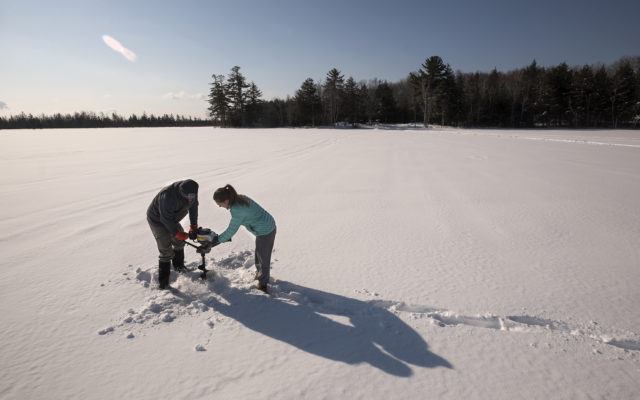
If you’re new to ice fishing, here’s what you need to know
By Pete Warner, Bangor Daily News Staff
Ice fishing in Maine presents unique challenges.
It’s colder, snowier and windier than standing in a stream or trolling on a lake on a spring day. Even so, targeting Maine’s fish through the ice can be fun and challenging. There’s a special thrill to pulling a fish through a hole in the ice.
There are special considerations anglers should make while fishing on hardwater that can make the experience more rewarding for them and less taxing on the fish.
That’s why I asked Francis Brautigam, the director of fisheries and hatcheries for the Maine Department of Inland Fisheries and Wildlife, to share some ice fishing tips.
Know the laws
As always, anglers must familiarize themselves with what species they may encounter on a specific water and know the laws and bag limits that pertain to those fish.
For example, at Moosehead Lake, from Jan. 1 through Feb. 14 (and also April 1-30), all landlocked salmon caught while ice fishing must be released alive without removal from the water.
That means anglers must be able to quickly identify species.
Choose the right hook
Ice fishing also presents some challenges for the fish. Anglers may put out five tip-ups, which means there are more lines to keep an eye on.
Rather than feeling a bite at the end of the line and setting the hook, it can take an angler several minutes to see a flag, make their way to the hole, set the hook and pull in the fish.
That’s why Maine law requires anglers to closely monitor their tip-ups.
“There is an opportunity for deeper hook ingestion, as opposed to the open water season when people are out there trolling,” Brautigam said. “That bait’s moving, so you’ve got a greater likelihood of that fish being hooked in the mouth versus deeper down in [while ice fishing].”
Since more hooks get swallowed, Brautigam suggests the use of steel hooks, which will rust after a fish is released.
“Particularly if the fish does ingest your bait and it’s in the stomach, a lot of the acids in there will actually help decompose that hook pretty quickly,” Brautigam said.
Be kind to the fish
There may be times when anglers aren’t sure whether a fish on their line is of legal length. That means they may put the fish on the ice in order to measure it.
On the other hand, when it’s obvious a fish is below legal size, simply leaving it in the water and removing the hook or cutting the leader can help improve its chances of survival.
“If you’ve got a fish that’s sub-legal, there’s really no need to take it out of the water,” Brautigam said. “We still advocate that the anglers, if it’s a lip hook and they can quickly remove the hook while the fish is still in the water, that’s in the best interest of the fish. If it’s a deep hook set, we still advocate for people to cut lines.”
Brautigam said fish are resilient and that DIF&W biologists often encounter fish that are swimming around with hooks and leaders visible but appear to otherwise be doing fine.
Exposure to extreme cold temperatures can hurt the fish. Brautigam stressed that if an angler catches a fish and doesn’t plan to keep it for a meal, taking it out of the water can lead to significant injuries.
“There’s tissue damage that happens very, very quickly, particularly around the eyes and gills,” he said.
This caution takes on more importance in the age of cellphones, because anglers often want to take photos or video of the fish after it has come up through the hole.
If it’s really cold, and the fish isn’t going to be taken home for a meal, its survival depends on how quickly and efficiently the hook is removed and it is returned to the water.
Don’t be afraid to keep a legal fish
In spite of the winter challenges, Brautigam said ice fishing helps DIF&W manage populations.
“I don’t want people thinking that winter angling is adversely affecting our fisheries, because it really isn’t,” he said.
Part of that stems from the way anglers in Maine approach fishing.
“We’re seeing such a high prevalence of catch-and-release fishing, it’s actually creating some problems in a bunch of waters around the state,” Brautigam said of DIF&W’s inability to reduce the numbers of specific species in bodies of water where there are too many fish.
“People really shouldn’t feel guilty if the current regulations allow for harvest,” he added.